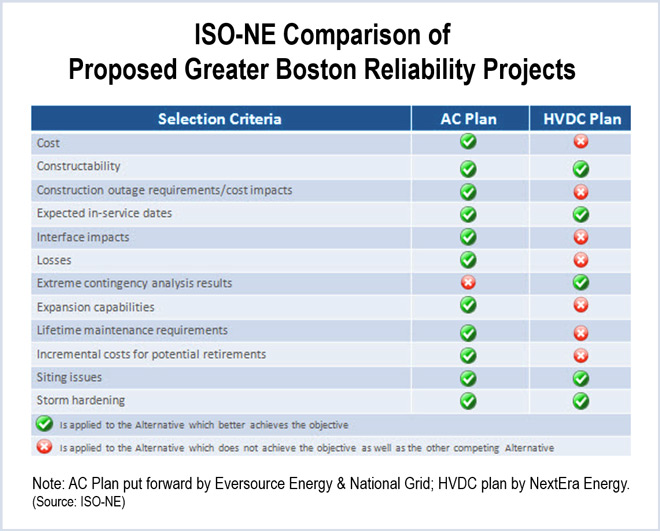By William Opalka
ISO-NE announced Thursday it had chosen a land-based, alternating current transmission project to address reliability concerns in the Boston area that came in about $260 million less than a competing undersea cable proposal.
The Greater Boston and Southern New Hampshire Reliability Project, proposed by Eversource (formerly Northeast Utilities) and National Grid, has a price tag of $739.7 million and is expected to be completed in 2018.
The all-AC project was chosen over a proposal from New Hampshire Transmission, which included both AC and underwater high voltage, direct current transmission.
ISO-NE said the AC plan was selected because it is significantly less expensive and it promised superior operating performance.
“Greater Boston is the largest area of consumer demand on New England’s power system, and its transmission system is in critical need of an upgrade,” said Stephen Rourke, vice president of system planning.
The project is past due, ISO-NE said in a statement. “The year of need for certain components of the Greater Boston Reliability Project was pre-2013. The ISO is analyzing whether additional special operating plans need to be developed to be able to manage the system in Greater Boston during peak load conditions” before the project is complete, it said.
The land-based AC plan is a 25-mile series of overhead lines in existing rights-of-way, connecting a substation in New Hampshire with one in Massachusetts, along with two eight-mile underground sections.
SeaLink Falls Short
The competing project outside Boston, dubbed SeaLink, was proposed by NHT, a subsidiary of NextEra Energy, owner of the Seabrook nuclear station in southern New Hampshire. It would have run 50 miles of undersea HVDC cable from the Seabrook substation to a substation in Massachusetts, with another 18-mile section buried on land.
The two project sponsors engaged in a vigorous debate about their opponents’ estimates and the costs to be incurred by ratepayers. The AC partners pointed to the initial high cost of SeaLink, its expensive technologies and the risks associated with undersea cables.
NHT contended SeaLink would be cheaper, saying the AC project would affect service, forcing utilities to buy more expensive replacement power during its construction. NHT upped the ante by offering to swallow any overruns above a cost cap of $679 million.
Both plans include the reconductoring of several 115-kV lines and other substation and transmission equipment upgrades, estimated to cost $221 million.
Concerns Identified in 2009
ISO-NE said the Boston area’s reliability concerns were identified in 2009. Several upgrades, including line reconductorings, were advanced to ensure reliability could be maintained after the retirement of all four Salem Harbor generating units — two in 2011 and two in 2014, according to the RTO.
In 2013, ISO-NE updated its original needs assessment to reflect several major system changes, including resource additions and retirements, changes in underground cable ratings in Boston, and updated load forecasts.
ISO-NE planning engineers worked with NHT to help develop its plan from a conceptual proposal into a workable solution. The RTO also worked with Eversource and National Grid to update components of the AC project based on the findings of the 2013 needs assessment. Updated versions of both plans were presented to the ISO-NE Planning Advisory Committee in June 2014.
The project will be discussed at Wednesday’s PAC meeting.
Eversource ups Tx Spending
In an earnings call with analysts last Thursday, Eversource identified the Boston area as one of its key areas for investment. It announced that it will spend $3.9 billion on transmission upgrades and expansions from 2015 to 2018, a $900 million increase over the $3 billion proposed a year ago.
It identified several big-ticket items in the area, including its share of the AC plan, totaling at least $707 million. There are also “hundreds” of reliability projects throughout New England coming in at $968 million.



